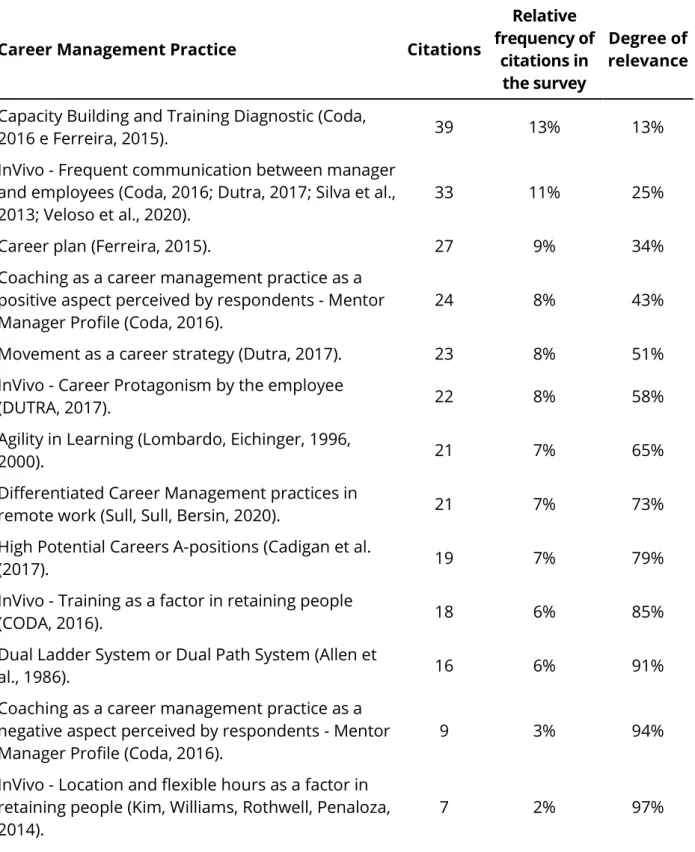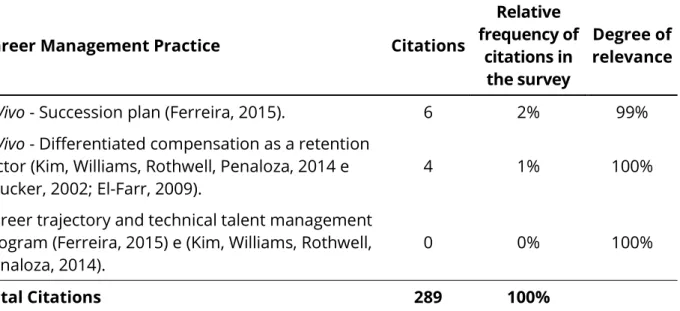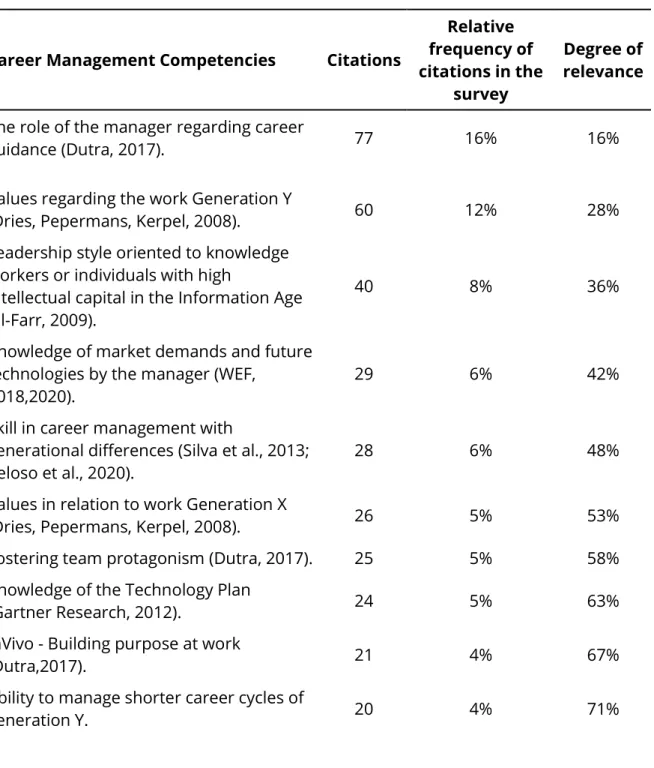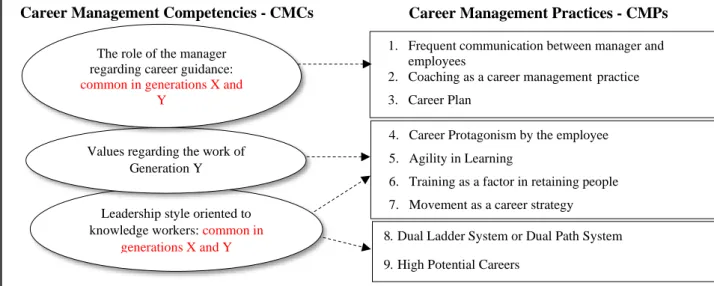In the last five years, the profile of the IT manager has not only become dependent on the availability of professionals in a booming market. According to the World Economic Forum (WEF, 2020) report, the jobs with the highest growth rate in the world are: data scientists, artificial intelligence specialists, full cloud developer engineers. People managers in the market in particular saw that the move to remote work would be positive for the organizational environment.
According to Dutra (2017), the relationship with the manager is important for the person to take the initiative in the career discussion without appearing arrogant or overbearing in this approach. Talent leadership also identifies people with high potential or key talent (Dutra, 2017), who have conditions to occupy critical positions in the future for the survival, development or expansion of the organization or the business.
3 METHODOLOGICAL PROCEDURES
In addition, remote career management presents new challenges of communication and understanding the affiliative needs of developing talent, which managers must adapt to the new reality. On the other hand, a study by Saka (2021) highlights the opportunity for greater productivity of IT professionals in the remote modality, which increased between 10% and 13% in 2020, in addition to opening up greater opportunities for task-oriented work, multiple simultaneous jobs that they present a challenge to the traditional work environment with high control over employee routines. Creating a sense of belonging, creating instruments to break the routine of isolated work and promoting new forms of social inclusion in the workplace is a bigger challenge for career managers of people, and they are increasingly striving to understand movements, uncertainties and encounter belonging. aspects in the relationship with the company.
Also opened the possibility to overcome the theoretical background with new insights, captured as InVivo categories according to the research methodology. These new categories were captured by the author, based on the criteria where the practice or competence cited by the director was not previously considered in the theoretical background, demonstrating innovation developed by the senior managers through their daily experiences in a new way to remote work on. pandemic season. Regarding the profile of the respondents, a group of managers-managers with more than 20 years of experience, located in the first tier of IT service companies operating in Brazil with more than 2,000 employees, part of the author's relations and some members at BRASSCOM, were selected .
The unit of analysis of the research is the perception of leaders of people in the information technology industry, the responsibility for career guidance of specialists of technical profiles in generations X-Y with an emphasis on the dynamics of remote work. Primary data were collected by videoconference, recorded, with the official written consent of the interviewee to participate in the scientific research. Content analysis was performed using the coding technique with the support of the Atlas.ti software.
As a result of the coding process, graphs were prepared with the frequencies of the codes extracted from Atlas.ti, which ranked the frequencies of the codes, from the highest to the lowest, which allowed the prioritization of the analysis categories, the export of tables that would be migrated to Microsoft Excel and enable Pareto an analysis that indicates the most relevant practices and competencies.
4 RESULTS AND CONCLUSIONS
Analysis category: CMCs identified Code Frequency Forms of retention in addition to financial compensation, the quality of work. It has been identified through the degrees of relevance of the analyzed CMPs that the aspects of the form of career orientation between manager-manager have been modified in the sense of the frequency of communication, being the 2nd highest degree (Coda, 2016; Dutra, 2017; Silva et al, 2013; Veloso et al., 2020) a need to revitalize the career plan (Ferreira, 2015) and promote it for the inclusion of the sense of belonging, place in the organization in the long term, combined with a promotion of Career Protagonism of the employee (Dutra, 2017). Regarding the career management competencies - CMCs - two open-ended questions were prepared and used in the semi-structured interviews, to seek confirmation of the theory in practice from the interviewed managers, where each manager.
In the content analysis of the interviews with the six executives, 21 Career Management Competencies or CMC were identified, of which 6 competencies represent degrees of importance above more than 50% of the frequency of citations in the survey. Considering that Generation Y knows and owns very well the technology plan in the Third Platform (Gartner Research, 2012), career managers should also closely follow the evolution of the technology plan to better dialogue with the different generations, giving them prompting them to encourage career protagonism. the employee. Based on the subcategory stratification tables of the analysis, it is possible for the CMCs to refer to the corresponding CMPs cited by the interviewees in each speech fragment.
With the fragments of the interviewees' speeches, granted in the quotes, it is possible to detect associations of CMCs and CMPs with the support of the Atlas.ti content analysis platform, which generates tables with the stratification of the codifications provided by the researcher performed. The values of Generation Y (Dries, Pepermans, Kerpel,2008) challenge career managers to provide more options on trajectories and speed to meet the shorter expectations of this generation. It is worth pointing out that a talent of the information age, who leads a Third Platform technology, seeks growth in the organization, in the same way that a high potential leadership talent has in the so-called Dual Ladder or Dual Path System (Allen et al. al., 1986).
Insights gleaned from career leaders contribute significantly to the development of advanced skills and practices that represent everything from the complexity to the volatility of the digital age. Also in Bersin and Waggi's (2020) research, 14% of participants valued the flexibility of their work schedule, and 11% recognized emotional support from the company or manager. Top management's concern about devoting time to this process is palpable, with second echelon support also encouraging more time for career counseling.
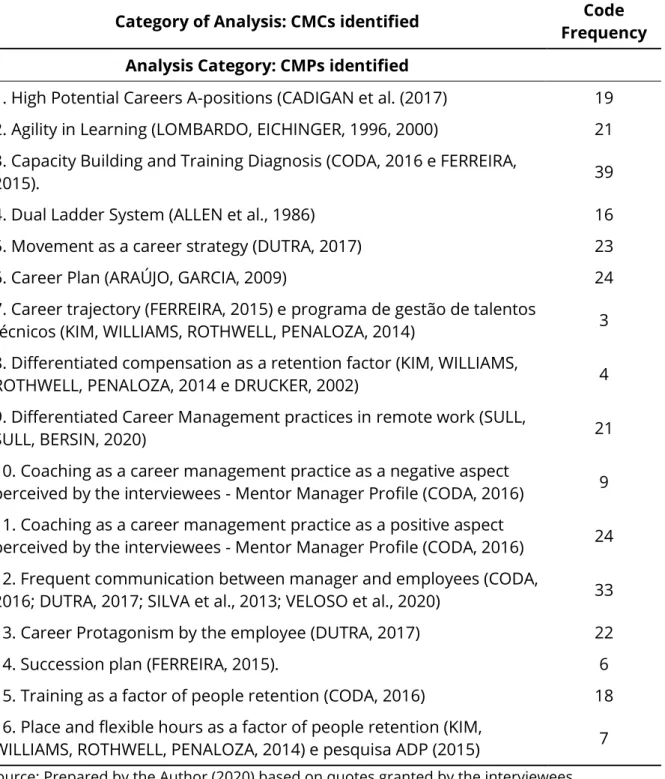
6 CONCLUSION
However, the career manager faces the challenge of feeding the workforce chain with lower costs, hiring and guiding younger Generation Y professionals with different levels of technology knowledge from the initial hiring stage – these could be professionals coming from an academic or even non-academic training. -academic background with high knowledge of specific technologies. At the end of the career manager development process, financial results will be obtained directly from a better balance of personnel costs, lower overheads with low turnover and a retraining plan with responsibilities shared between the company and the employee. Managers have consolidated their career management practices during more than 15 months of pandemic and are beginning to question the best balance to return to face-to-face work.
Questions about the importance of hybrid models, new corporate behavior, new culture without the need for face-to-face communication formats and focused on the best productivity of technical teams. Certainly, the challenges of retention and career direction have increased for the IT services leader in Brazil, as the market is in a high tide of exponential investment in third platform technologies and the competition for the best talent has become more intense. In Brazil, there are significant constraints on meeting the demand for talent, increasing the importance of new competencies and career management practices to retain all high-performing talent.
Both established managers and new leaders in education could develop new competencies and career guidance practices to increase performance among Generation X, Y and Z, which is increasingly represented in IT services companies. In addition, there is room to develop a research agenda that includes Generation Z, which has recently been researched on how a leader would enable leadership style, environment, and meet the many career needs related to the expectations of being part of a large organization, but considered strategic initiatives, but maintaining the financial predictability required by senior management and shareholders. The process of retaining people is a challenge for managers, from understanding behavioral traits and training needs to using new technologies such as artificial intelligence to make people decisions easier for managers.
This opens a path with many possibilities for the development process of new leaders on how to innovate in more horizontal, agile, multidisciplinary and borderless career guidance organizations.
Covid-19 and the new technologies of organization: Digital exhaust, digital footprints and artificial intelligence in the wake of remote work”. Technological innovations in the working environment and the career of the millennial generation - Innovation &. The Future of Jobs report, Forum's Towards a Requalling Revolution: Industry-Led Action for the Future of Work report.
Assess the perception of leaders of IT services companies regarding their. management competencies most relevant to the career development of their employees at a technical level in the context of the Digital Age. What is your perception about the importance of the role of the IT manager. and the protagonism of the professional himself regarding the career development process in the Digital Age. What are the most relevant competencies in your strategy for managing people's. careers, especially in the remote work dynamic we are experiencing in 2020.
Career plan: consists of the elaboration of documents with the steps defined during the time that the employee and the organization will work for the professional development, which will be assessed in any case. Career paths: definition for the employee, given by the organization, about the possibilities of his growth. within the organization, according to the existing job structure. Dual Ladder System: Are there opportunities to advance in the technical or managerial line with equivalent degrees of recognition and compensation either for a . knowledge worker or for the leadership line people.
Movement: Use of tools defined with the employee or between supervisors regarding vertical and horizontal movement in the employee's career.
